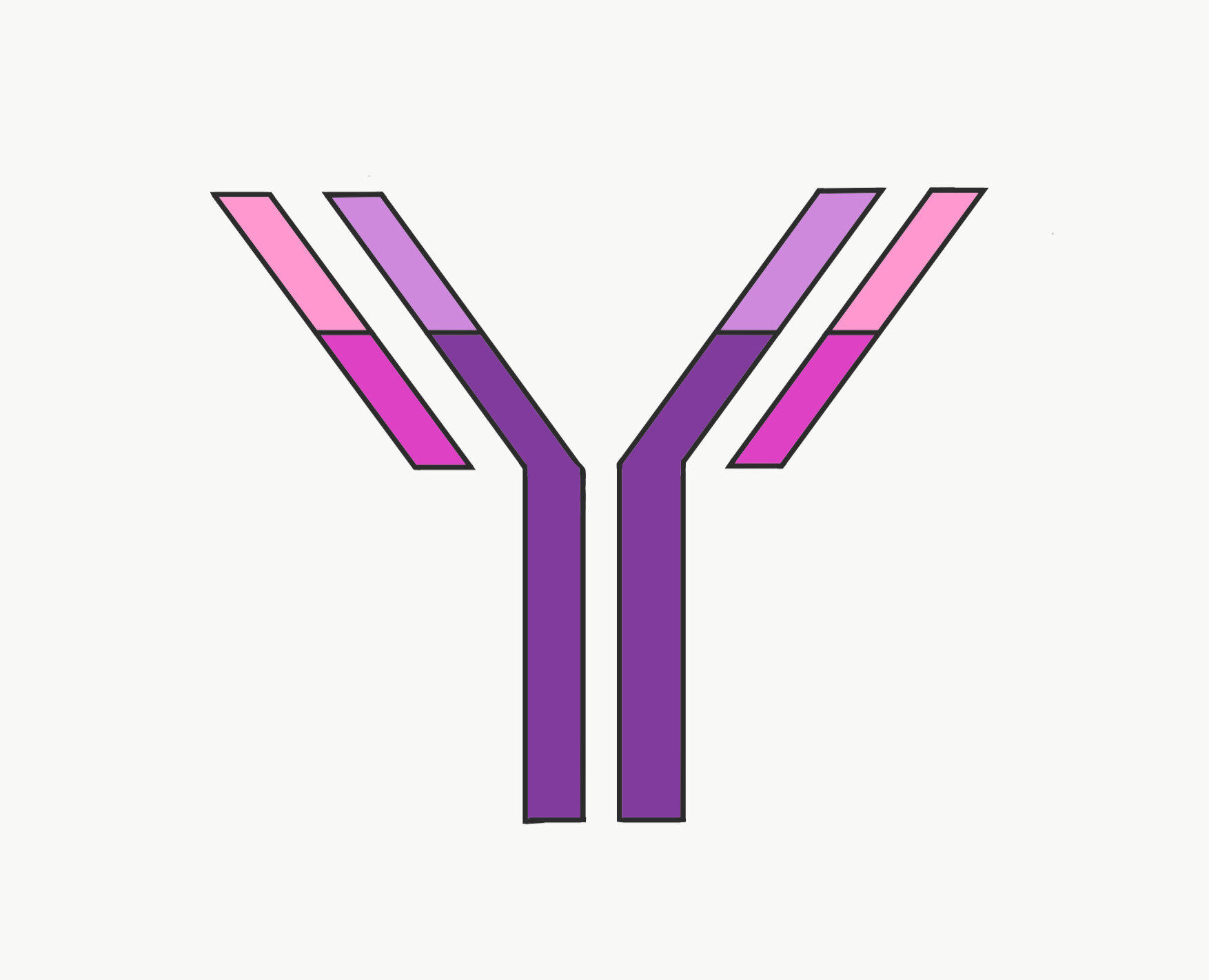What are the different types of immunotherapy?
This article explains different types of immunotherapy used in cancer treatment.
Illustration of a monoclonal antibody.
Types of Immunotherapy
The immune system is responsible for protecting the body from foreign substances.[1] Immunotherapy is a treatment that utilizes the body’s immune system to attack and kill cancer cells. The main types of immunotherapy are monoclonal antibodies (mAbs), [MB1] chimeric antigen receptor (CAR) T-cell therapy[MB2] , immune checkpoint inhibitors[MB3] , cancer vaccines[MB4] , cytokines[MB5] , and immunomodulators.[2]
Monoclonal antibodies (mAbs) are man-made versions of antibodies, immune system proteins that can identify foreign substances (antigens) and trigger an immune reaction to kill them. Depending on the type of antigen targeted by the antibody, monoclonal antibodies can act as targeted therapies as well as immunotherapy.[3]
T cells are a type of white blood cell that play large role in the immune response. CAR T-cell therapy involves removing T cells from a patient’s blood, altering the T cells in a lab by adding a receptor to make them better at targeting cancer cells, and putting the T cells back in the patient’s blood. Different cancers have different antigens, so the receptor added to the T cells varies depending on the type of cancer. The process for CAR T-cell therapy can take several weeks as it takes time to grow a sufficient amount of cells. Sometimes, chemotherapy (usually a low dose) is given before the T cells are infused back into the patient to lower the amount of other immune cells so the CAR T cells can take over and begin fighting the cancer.[4]
Immune system checkpoints are molecules on immune cells that must be activated to trigger an immune reaction. Cancer cells often make use of these checkpoints to inactivate the immune response and avoid being attacked. Immune checkpoint inhibitors essentially removed the regulations of the immune checkpoints so that the immune system can target cancer cells at full force.[5]
Vaccines can be used both to prevent and treat cancer. These vaccines function in the same way other vaccines work by introducing the body to a foreign substance (virus, bacteria, cancer, etc.) so it can build up an immune defense against it. Vaccines to prevent cancer protect against viruses that can cause cancer. Vaccines used to treat cancer can be made up of cancer cells, parts of cancer cells, or pure antigens from cancer cells. A patient’s immune cells may be removed and exposed to these cancer cells or antigens to create the vaccine which is then injected back into the patient. The immune system is the primed to attack cancer in the body. Because of immune system memory, these vaccines should be able to keep the immune system fighting against any cancer cells for long after it is given. These vaccines are also typically combined with other substances (called adjuvants) that can help further boost the immune system.[6]
Cytokines are proteins that control the growth and activity of other cells including immune cells, blood cells, and other cells that contribute to the immune response. Cytokines also send signals that lead to abnormal cells dying and normal cells living longer, thereby helping to kill cancer cells. Man-made versions of cytokines are injected into a muscle or vein to boost the immune system.[7] Immunomodulators are mainly used to treat multiple myeloma and a few other cancers. They can work directly on the immune system to turn proteins up and down.[8]
References
1. Immune System https://my.clevelandclinic.org/health/articles/21196-immune-system (accessed Jun 16, 2021).
2. Immunotherapy https://www.cancer.org/treatment/treatments-and-side-effects/treatment-types/immunotherapy.html (accessed Jun 16, 2021).
3. Monoclonal Antibodies and Their Side Effects https://www.cancer.org/treatment/treatments-and-side-effects/treatment-types/immunotherapy/monoclonal-antibodies.html (accessed Jun 16, 2021).
4. CAR T-cell Therapy and Its Side Effects https://www.cancer.org/treatment/treatments-and-side-effects/treatment-types/immunotherapy/car-t-cell1.html (accessed Jun 16, 2021).
5. Immune Checkpoint Inhibitors and Their Side Effects https://www.cancer.org/treatment/treatments-and-side-effects/treatment-types/immunotherapy/immune-checkpoint-inhibitors.html (accessed Jun 17, 2021).
6. Cancer Vaccines and Their Side Effects https://www.cancer.org/treatment/treatments-and-side-effects/treatment-types/immunotherapy/cancer-vaccines.html (accessed Jun 17, 2021).
7. Cytokines and Their Side Effects https://www.cancer.org/treatment/treatments-and-side-effects/treatment-types/immunotherapy/cytokines.html (accessed Jun 16, 2021).
8. Immunomodulators and Their Side Effects https://www.cancer.org/treatment/treatments-and-side-effects/treatment-types/immunotherapy/immunomodulators.html (accessed Jun 17, 2021).
[MB1]Link to ‘monoclonal antibody therapy’ article
[MB2]Link to ‘CAR T-cell therapy’ article
[MB3]Link to ‘immune checkpoint inhibitor therapy’ article
[MB4]Link to ‘cancer vaccines’ article
[MB5]Link to ‘cytokine therapy’ article

